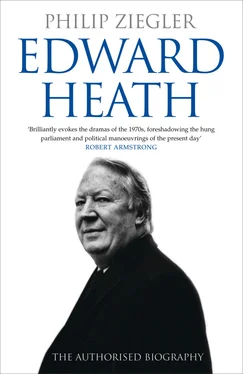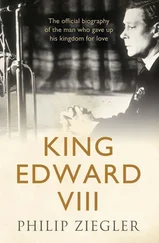‘Nobody knows whether we can expect an election in the near future,’ Heath had told a friend in August 1951. ‘Personally, I don’t think there will be one for the very simple reason that the Government has nothing to gain but a lot to lose. However, only time will tell.’ 24Time had told, and had showed that Attlee disagreed with Heath. Though Morrison turned out to have had good reason for his doubts, Attlee was not acting irrationally. His ministry was in tatters. Cripps and Bevin had retired through ill-health; Bevin’s successor, Morrison, had made a disastrous mess of foreign policy in the Middle East; Heath’s Oxford contemporary, Harold Wilson, together with Aneurin Bevan, had resigned in protest at the increased spending on defence. Attlee could have struggled on but he concluded that the best chance for Labour was to go quickly to the country and then to rebuild the government with new blood and a new mandate. The election was called for 25 October.
Heath must have felt reasonably confident as he hurried back across the Atlantic. On the national scene all the indications were that Labour would do worse than at the last election; in his own constituency he had consolidated his position. He had been an exemplary constituency MP; had dealt conscientiously with the problems of the voters; attended endless fetes, garden parties, dances, rotary lunches, meetings with businessmen; had escorted innumerable constituents around the House of Commons. Local elections had strengthened the position of the Conservatives. He had beaten Ashley Bramall once and was sure that he could do so again.
But it was not only the election that preoccupied him. Shortly before he left for the United States his mother had been diagnosed with cancer and had almost immediately been operated on at the Ramsgate General Hospital. Heath thought of cancelling his tour but the operation seemed to have gone well and the prognosis was that she would be home and well on the way to recovery by the time he got back. She was home, but she was in pain and obviously extremely weak. His sister-in-law Marian told Michael Cockerell that she and her husband were with Ted in the kitchen in the Broadstairs house when William Heath broke it to them that his wife was dying. ‘Ted was absolutely devastated,’ she said. ‘I don’t think I ever saw him before or after as he was on that day.’ 25
It took the realisation that he was about to lose his mother to make him fully take in how much she had meant to him. He was not dependent on her, in the sense that he turned to her for advice or for moral support, but the love which she had lavished on him over the years, the knowledge that in her eyes he could do no wrong and should be the beneficiary of any and every sacrifice, had created a bond between them which he enjoyed with no one else. Though he fought the election campaign in Bexley with all the energy and conscientiousness that his supporters expected of him, the thought of her suffering was with him every moment. Each evening he would drive back to the coast to be with her; he would sit at the piano in the room directly below her bedroom playing the old sentimental songs which his father had used to sing and which he knew his mother cherished: ‘In a Monastery Garden’, ‘Love’s Old Sweet Song’, ‘When You Come to the End of a Perfect Day’. She died on 15 October, ten days before polling day. Ashley Bramall suggested that there should be a day’s truce in the electioneering on the day of her funeral. Heath gratefully accepted. Margaret Roberts, still battling away in the safe Labour seat of Dartford, wrote to commiserate: ‘I am so glad your mother saw your initial success and the way in which you followed up with a steady ascent to great things.’ The precipitous descent which she was one day to engineer lends a certain irony to this letter but, as Heath acknowledged in his memoirs, it was ‘most generous’ and, without doubt, sincerely meant. 26
‘As I think you know, I loved and admired her tremendously,’ wrote the former Kay Raven. His relationship with his mother had not been the only one that had ended about this time. A year or so before, Kay had written to announce her engagement to a regular air force officer and former bomber pilot, Richard Buckwell. ‘I hope you will be glad for me, you know I’m rather a loving kind of girl and must have been a horrid bore for you.’ 27For nearly fifteen years she had looked for something in Edward Heath that he was unable to supply; finally she had decided that life was too short and that she must move on. ‘Apparently her family persuaded her to go on holiday with a group of young friends, and that was when she got engaged,’ said William Heath. ‘She was keen on him. He wasn’t, or if he was he never showed it.’ It was Mrs Heath who seems to have been the most upset by the news; she had set her heart on Ted’s marriage with Kay and burst into tears when she heard of the engagement. 28
Ted Heath remained impassive. He was more moved than he cared to admit, however. For so many years he had taken it for granted that she was there, permanently available in case he should one day decide that the time had come for him to marry. It is conceivable that the death of his mother and the fact that he was now well launched on his climb up the political ladder might have impelled him to marry Kay; conceivable, but on balance improbable. By 1950 he was set in his bachelor ways; the thought of sexual intercourse or of procreation would have filled him with mild dismay; how could he fit a woman into his crowded life; what sacrifices might he not find imposed on him? But her engagement was still a blow to his pride, and the closing of a door which he had liked to feel was at least a crack ajar. He soon convinced himself that he had been in love and had been robbed of a cherished aspiration. Many years later Michael Cockerell, with that startling temerity which adds such zest to his television interviews, asked Heath whether he had been saddened by Kay Raven’s engagement. ‘Yes,’ he replied. When asked if he had ever been in love, Heath again replied, ‘Yes. Why shouldn’t one love?’ Almost incredibly, given his habitual reluctance to express emotion, he seemed on the point of tears. 29He kept a photograph of Kay by his bedside, though it seems to have disappeared before he died. She became a convenient alibi; designed as much to deceive himself as anyone else, to be adduced whenever it seemed possible that he might become close to some other woman. He had loved and lost, once was enough: or that, at least, was the official story. Though he was to get to know many women over the next forty years and become attached to two or three of them, there was never again to be a suspicion of romance, let alone matrimony.
Perhaps inevitably this absence of female involvements meant that there were rumours that Heath was homosexual. In April 2007 one of the Conservative leaders in the London Assembly, Brian Coleman, alleged in the New Statesman that Heath regularly ‘cottaged’ along the motorways and had only desisted when he became a Privy Councillor and MI5 warned him that he must mend his ways. When asked for evidence of this Coleman was unable or unwilling to provide names but said that it was ‘generally known’ in the House of Commons that Heath was gay. General knowledge seems to have been based on little or no information. No man has ever claimed to have had any sort of sexual relationship with Heath, no hint of such an involvement is to be found among Heath’s papers and everyone who knew him well insists that he was not in the least that way inclined. He had friendly relationships with a number of women over the years, but never, it seems, one in which there was any hint of a romantic, let alone sexual, element. It may be that, after Kay Raven decided to marry someone else, he determined never to allow himself to be in a position in which he could be let down (as he might have seen it) in that way again. He certainly had a weak sex drive and may have been to all intents and purposes asexual: a condition which is by no means rare but which those who are more conventionally endowed find hard to believe exists. He was perhaps the poorer for this deficiency, but at least it left him with more time and energy for the other activities which filled his crowded life. 30
Читать дальше












